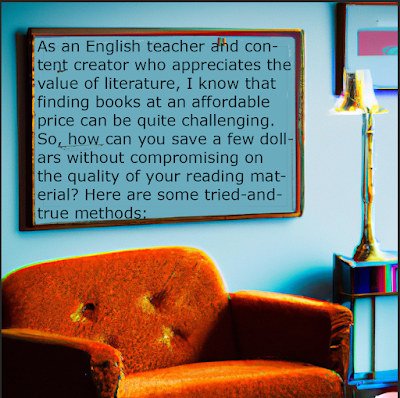Reading is a lifelong passion of mine. I've bought books from garage sales for a dollar, and I've also purchased expensive hardcovers from museum bookstores. It's all part of being a book lover! But let's face it: books can get expensive.
Online Marketplaces
- Amazon Used Books: When it comes to purchasing books online, Amazon is a go-to destination. But before you click "Buy Now" on that brand-new hardcover, take a moment to explore the used book options. Often, reputable sellers like Better World Books offer used copies for as little as $1 to $3. However, keep in mind that shipping and handling costs can add up, so consider that in your budgeting.
- Other Online Vendors: Besides Amazon, websites like AbeBooks and Better World Books provide affordable book options. You'll have to pay shipping, but if a book usually costs $30, you could find it for as little as $10. Keep in mind that used books, whether you buy them online or at a shop, often have evidence of use, such as folded pages and markings inside the books left by previous owners. When shopping online for used books, be sure to read the description notes carefully, as sellers will tell you the condition of the book. Each used book is different!
Annual Sales and Book Fairs
- Major Annual Book Sales: If you live in a large metropolitan area, keep an eye out for major annual book sales like the Symphony Book Sale in New Orleans run by the Louisiana Philharmonic Orchestra. They rent out the University of New Orleans arena to sell their books! In New York, if you like antiquarian books (which are definitely more expensive), go to the annual Antiquarian Book Sale. These events often offer thousands of books for as low as $1. Yes, it's almost like a treasure hunt for book lovers!
- Don't know what's available in your area? Look for non-profit organizations, hospitals, schools, churches, temples, synagogues, mosques, and other venues to see if they have book sales. When I worked at a small liberal arts college, you'd be amazed at how many donations of books we'd receive. So it doesn't hurt to ask around to see if organizations have books to either sell cheaply or even give away.
Local Discoveries
- Your Local Book Shop: Yes, locally-owned bookshops still exist! Support them and buy a book. Even bookshops that sell new books at full price often have books for sale in a bin or in a box. Just ask. The classy Argosy bookshop in New York has an outside table with books for as little as a dollar.
- Specialized Bookstores: If you're in a place like New York City, visiting used bookstores like The Strand near Union Square or Argosy Books in Midtown Manhattan can be a treat. If you're on the West coast — try Moe's. These stores often put out cheaper books on tables outside the shop. The drawback? They might not have the latest releases or bestsellers.
- Neighborhood Garage Sales: Never underestimate the power of a weekend garage sale. Many people put out books they no longer need, and you can often find gems for free or at a nominal price.
- Public Libraries: Your local library might have sales or even give away books that are being taken out of circulation. Although time-consuming, the hunt can yield rich rewards.
- Street Vendors: On major avenues like Malcolm X Boulevard or Broadway, or in Union Square, you'll often find men with tables full of books, usually going for a dollar.
- Thrift Stores: Don't underestimate the joy of discovering a unique find at Goodwill, The Salvation Army, or Housing Works! While these thrift stores primarily focus on kitchen utensils and clothing, they often feature a book bin or a dedicated wall for used books. Generally, thrift stores offer the lowest prices, but keep in mind that they don't curate their book selection. The condition you find the book in is what you get.
The Joy of Serendipity
- Serendipity: Sometimes the best finds are unplanned. While walking around your neighborhood or grabbing a coffee, you might stumble upon free books that people leave outside their homes.
- Free Books: Yes, you can find various places that offer books for free. Libraries and religious organizations are common sources, as well as individuals like the woman who leaves books on her stoop. Additionally, neighborhood organizations often sponsor "Little Free Libraries," where you can take a book and leave one in return. Personally, I have a soft spot for the Brooklyn Book Bodega (full disclosure—I volunteer there), which provides free books to New Yorkers.
Tips for eBook Lovers
Finding cheap eBooks is trickier. However, if you're adept at internet searches, you might find a PDF version of the book you're looking for, although the legality of this varies.
So, there you have it: a plethora of options to get your hands on cheap books. Whether you prefer physical copies or eBooks, there's something out there for every budget-conscious reader. Happy reading!



